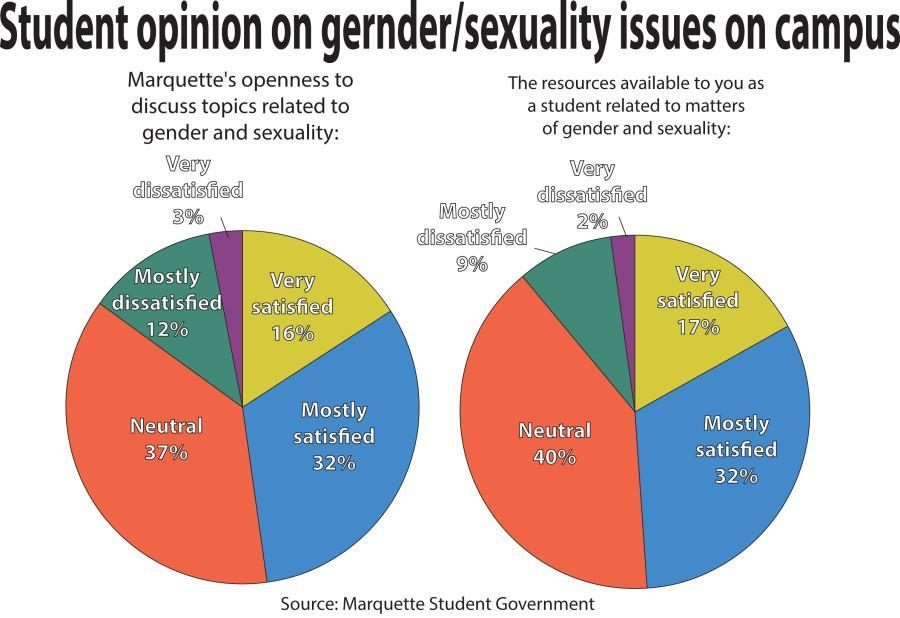Marquette Student Government released the results of its gender and sexuality survey Thursday, showing a majority of students are either satisfied with or neutral toward the gender and sexuality resources offered by the university.
MUSG senators and staff conducted the survey manually during the two-week period from Oct. 21 to Nov.1, collecting 977 responses to questions about gender and sexuality conversations and how the university handled the revocation of its sponsorship of FemSex, a weekly gender and sexuality student workshop geared toward women. The official summary warned that students were not sampled randomly and that the survey “was not necessarily ‘representative.'” While only about 300 respondents, or 28 percent, had heard of FemSex before taking the survey, the majority said they were comfortable with the university’s tone regarding gender and sexuality.
“I think we’ve seen that the majority of Marquette students feel very comfortable with issues of gender and sexuality on campus,” said MUSG Executive Vice President Zach Bowman, a junior in the College of Arts & Sciences. “They feel like they have resources to discuss those things, and they feel like the university is open to having those discussions. But simultaneously we also see a substantial minority of students who feel the exact opposite on those issues and have concerns about the resources available and Marquette’s openness to those issues.”
Of the 977 students surveyed, 15 percent said they felt dissatisfied with Marquette’s openness to discussing gender and sexuality issues on campus. Only 11 percent said they felt dissatisfied with the resources available to students on matters of gender and sexuality.
The portion of students who had heard of FemSex were asked two follow-up questions about how the university handled the closing of the workshop. Half felt that the university was not transparent enough in its reasoning for closing the workshop while 31 percent felt they did not have enough information.
When asked whether the university should have revoked sponsorship of FemSex, 41 percent felt that the university was wrong, while 34 percent felt they did not have enough information. Out of women surveyed, 44 percent felt that the university was wrong in closing FemSex, compared to 35 percent of men.
The survey was written by off-campus senators Natasha Hansen, a senior in the College of Arts & Sciences and the chair of the Student Life Committee, and Mary McCarthy, a senior in the College of Arts & Sciences.
“We found the results of the survey compelling, and it’s clear that a substantial amount of students have concerns about conversations regarding gender and sexuality on campus,” Hansen said in an email.
Hansen said the Student Life Committee has not decided if anything will be done to follow up on the results of the survey, but is “exploring the various options.” Bowman said MUSG will continue working on gender and sexuality issues on campus, but did not state any specific plans.
The amount of respondents is significantly larger than MUSG normally gets with manually conducted surveys. According to information provided by Jon Dooley, senior associate dean of student development and MUSG’s advisor, four of the most recent manually conducted surveys showed significantly less student participation.
An alcohol policy survey conducted over the course of two weeks early last semester had 187 respondents. Another survey conducted in October 2012 about the University Core of Common Studies had 212 respondents. A survey about dining conducted over 10 days during the spring of 2012 had 389 respondents, and a survey about concerts conducted in November 2011 had 381 respondents.


